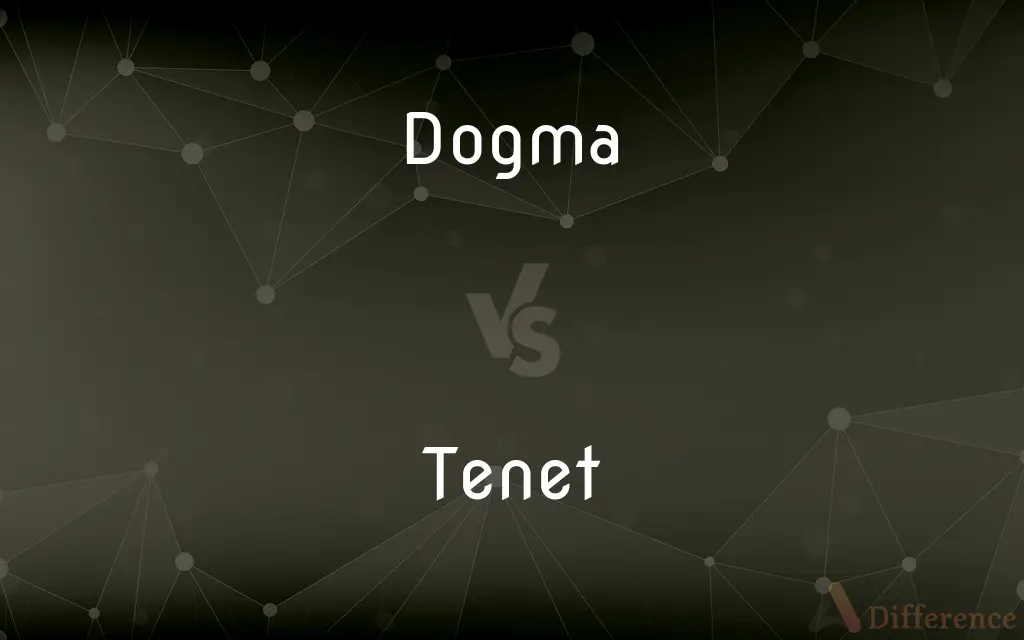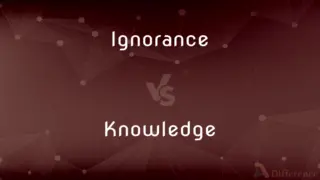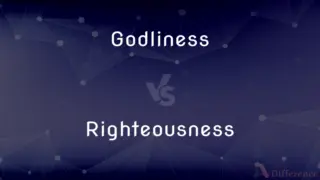Dogma vs. Tenet — What's the Difference?
By Tayyaba Rehman & Maham Liaqat — Updated on April 27, 2024
Dogma often implies an authoritative, unchallengeable belief imposed by an institution, while a tenet refers to a principle or belief generally held as part of a broader philosophical or religious system.

Difference Between Dogma and Tenet
Table of Contents
ADVERTISEMENT
Key Differences
Dogma is typically associated with religious doctrines considered to be authoritative and not to be disputed or doubted, whereas tenets are beliefs or principles that form the foundations of a system of beliefs but are generally open to interpretation.
Dogma is often used in a slightly negative context, suggesting rigidity and compulsory acceptance, whereas tenets, though fundamental, usually suggest a more accepted and shared belief within a community.
Institutions, particularly religious ones, often declare dogmas to establish firm beliefs among their followers, on the other hand, tenets may be adopted by individuals and groups without any authoritative imposition.
Dogmas are imposed by an authority as a necessary belief for the members of the community, while tenets, though important, do not usually carry the same level of enforced acceptance.
The acceptance of dogma is often considered a measure of loyalty to an institution, whereas adherence to tenets reflects personal or communal conviction and understanding.
ADVERTISEMENT
Comparison Chart
Definition
A principle or set of principles laid down by an authority as incontrovertibly true
Any opinion, principle, doctrine, or belief held as true by members of a profession, group, or movement
Imposition
Typically imposed by an authority
Generally accepted without imposition
Flexibility
Non-negotiable and rigid
More flexible and open to interpretation
Context
Often religious or ideological
Can be religious, philosophical, or professional
Perception
Sometimes viewed negatively due to its coercive nature
Usually viewed neutrally or positively
Compare with Definitions
Dogma
An established belief or principle held by a group.
The political dogma of that era was not easily challenged.
Tenet
An established or commonly accepted belief held by members of a group.
The tenet of patient confidentiality is sacred among doctors.
Dogma
A point of view or tenet put forth as authoritative without adequate grounds.
His ideas were criticized as mere dogma.
Tenet
A principle that is held as true by an organization or movement.
Environmental protection is a tenet widely accepted by the party.
Dogma
Something held as an established opinion.
It is a dogma in literature that adverbs should be used sparingly.
Tenet
Any opinion or belief that forms a part of a larger system.
Non-violence is a central tenet of their philosophy.
Dogma
A principle or belief or a group of them.
The dogmas of the scientific community change as new discoveries are made.
Tenet
A doctrine or belief accepted as authoritative by some group or school.
The tenets of Freudian psychology have influenced many.
Dogma
A doctrine or body of doctrines concerning faith or morals formally stated and authoritatively proclaimed by a church.
The dogma of the Immaculate Conception is a core doctrine for Catholics.
Tenet
A principle, belief, or doctrine generally held to be true.
One of the basic tenets of democracy is freedom of speech.
Dogma
Dogma in the broad sense is any belief held with undefended certainty. It may be in the form of an official system of principles or doctrines of a religion, such as Roman Catholicism, Judaism, or Protestantism, or atheism, as well as the positions of a philosopher or of a philosophical school such as Stoicism.
Tenet
A principle or belief, especially one of the main principles of a religion or philosophy
The tenets of classical liberalism
Dogma
A doctrine or a corpus of doctrines relating to matters such as morality and faith, set forth in an authoritative manner by a religion.
Tenet
A doctrine, principle, or position held as part of a philosophy, religion, or field of endeavor.
Dogma
A principle or statement of ideas, or a group of such principles or statements, especially when considered to be authoritative or accepted uncritically
"Much education consists in the instilling of unfounded dogmas in place of a spirit of inquiry" (Bertrand Russell).
Tenet
An opinion, belief, or principle that is held as absolute truth by someone or especially an organization.
Dogma
An authoritative principle, belief or statement of opinion, especially one considered to be absolutely true and indisputable, regardless of evidence or without evidence to support it.
Tenet
Any opinion, principle, dogma, belief, or doctrine, which a person holds or maintains as true; as, the tenets of Plato or of Cicero.
That al animals of the land are in their kind in the sea, . . . is a tenet very questionable.
The religious tenets of his family he had early renounced with contempt.
Dogma
A doctrine (or set of doctrines) relating to matters such as morality and faith, set forth authoritatively by a religious organization or leader.
In the Catholic Church, new dogmas can only be declared by the pope after the extremely rare procedure ex cathedra to make them part of the official faith.
Tenet
A religious doctrine that is proclaimed as true without proof
Dogma
That which is held as an opinion; a tenet; a doctrine.
The obscure and loose dogmas of early antiquity.
Dogma
A formally stated and authoritatively settled doctrine; a definite, established, and authoritative tenet.
Dogma
A doctrinal notion asserted without regard to evidence or truth; an arbitrary dictum.
Dogma
A religious doctrine that is proclaimed as true without proof
Dogma
A doctrine or code of beliefs accepted as authoritative;
He believed all the Marxist dogma
Common Curiosities
What is dogma?
Dogma refers to a principle or set of principles that are laid down by an authority as incontrovertibly true.
Can tenets become dogmas?
Yes, tenets can evolve into dogmas when they are officially endorsed by an authoritative body and are required to be accepted without question.
How does dogma differ from tenet in terms of flexibility?
Dogma is typically non-negotiable and imposed by an authority, whereas tenets are more flexible and open to interpretation.
Why might dogma be viewed negatively?
Dogma can be seen negatively due to its rigid and sometimes coercive nature, mandating belief rather than encouraging personal conviction.
Is dogma always religious?
While dogma is often associated with religious doctrines, it can also apply to any authoritative set of principles in other contexts, such as political ideologies or cultural norms that are seen as unassailable truths.
What role do tenets play in shaping a group's identity?
Tenets play a crucial role in defining the core values and principles around which a group or community forms its identity. They help in guiding the behavior and decisions of its members and in distinguishing the group from others.
What is a tenet?
A tenet is a belief or principle that is generally held to be true by members of a particular group, often forming part of a larger system of beliefs.
Can a tenet be questioned or debated within its community?
Yes, tenets are generally open to discussion and debate within the community that holds them. This flexibility allows for evolution and adaptation of beliefs as new insights or perspectives emerge.
How are dogmas enforced within a community?
Dogmas are usually enforced through formal declarations by authoritative bodies within a community, such as religious leaders or governing entities, and often come with expectations of compliance and penalties for dissent.
How can understanding the difference between dogma and tenet help in intercultural or interfaith dialogue?
Recognizing the distinction between dogma and tenet can aid in intercultural or interfaith dialogues by identifying which beliefs are rigidly held and which are more flexible, thus facilitating a more respectful and understanding communication about differing beliefs.
Share Your Discovery

Previous Comparison
Ignorance vs. Knowledge
Next Comparison
Godliness vs. RighteousnessAuthor Spotlight
Written by
Tayyaba RehmanTayyaba Rehman is a distinguished writer, currently serving as a primary contributor to askdifference.com. As a researcher in semantics and etymology, Tayyaba's passion for the complexity of languages and their distinctions has found a perfect home on the platform. Tayyaba delves into the intricacies of language, distinguishing between commonly confused words and phrases, thereby providing clarity for readers worldwide.
Co-written by
Maham Liaqat















































